The 7 best orbital sanders for your next DIY project
Get your hands on the best orbital sanders and say goodbye to the hard work involved in sanding. Check our top picks to help make your next DIY project a breeze

Adding the best orbital sanders to your home improvement toolbox is a must for any avid DIYer. It’s a smart, versatile piece of kit that takes the hard work out of any project that needs some serious sanding.
An orbital sander can create a smoother, more even finish that other types of sanders will struggle to match. They are great for sanding large flat surfaces, and painted surfaces such as doors, windows and skirting boards.
Here we take a look at a mix of the best cordless and corded models you can buy. Giving you the choice to get something that brings quality and matches your budget.
The best orbital sanders for your next DIY project
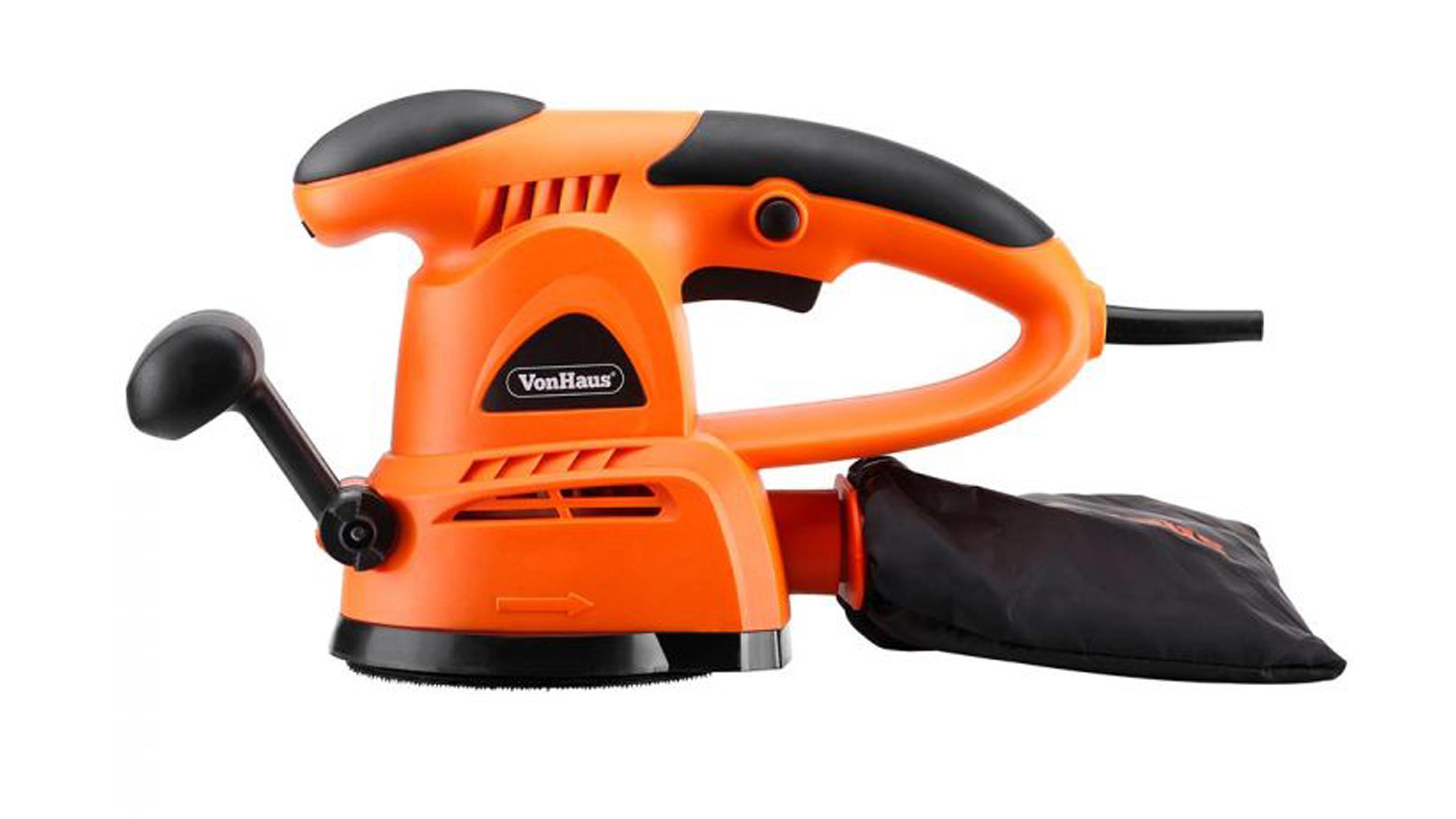
1. VonHaus random orbital sander
Our expert review:
Specifications
Reasons to buy
Reasons to avoid
The VonHaus 3515091 random orbital sander gives impressive sanding power in an affordable, no-fuss package. A great option for DIYers who have a few big sanding projects ahead of them, such as sanding all the walls in a room ahead of painting or wallpapering.
The sander is corded rather than cordless and comes with a 2m lead. It uses 125mm circular sanding pads, has a dust extraction port with a dust bag and has a fold out handle to give extra stability when needed.
Read our in-depth VonHaus random orbital sander review today
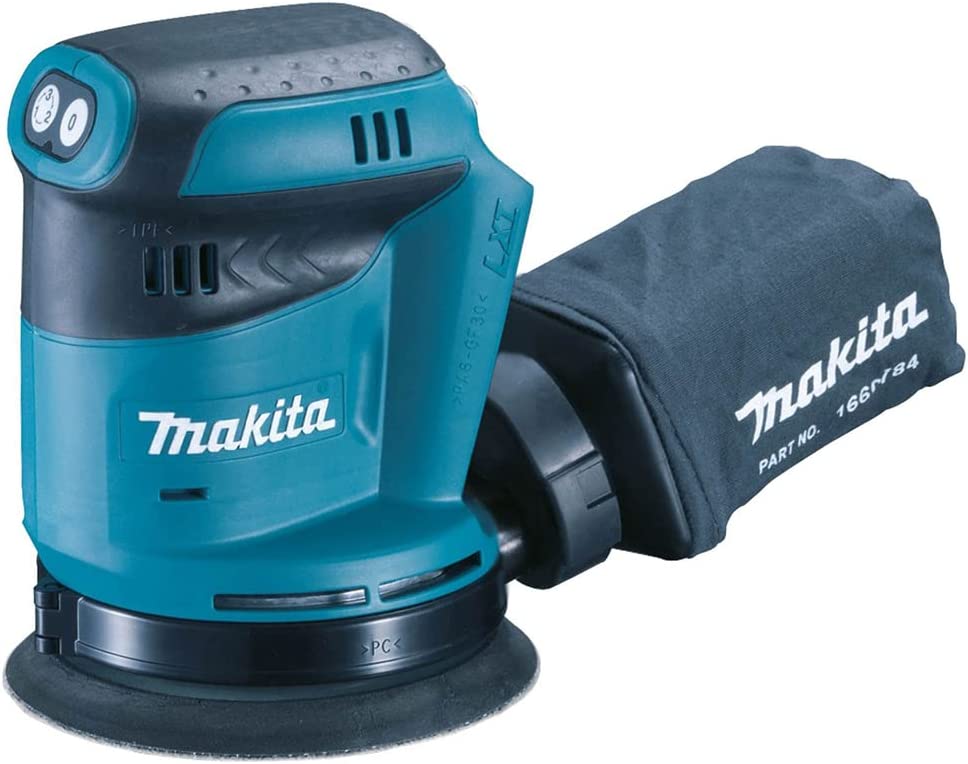
2. Makita DBO180 cordless 125mm random orbit sander
Our expert review:
Specifications
Reasons to buy
Reasons to avoid
The Makita is a cordless finish sander that is great for sanding horizontal surfaces where it’s not easy to get mains power. It has very impressive battery life with a fast charging time of 45 minutes. Even better if you intend to buy more tools that use the same battery platform.
While it's great on wood metal and plastic, it's not a lightweight sander and if you need to do a lot of overhead sanding, e.g ceilings, then you want to consider another model in this guide.
We were also impressed by the dust bag and its ability to capture dust. Although this model is aimed at experienced DIYers and professionals, its simple operation means it can also be used successfully by beginners.
Read our full Makita DBO180 cordless 125mm random orbit sander review now
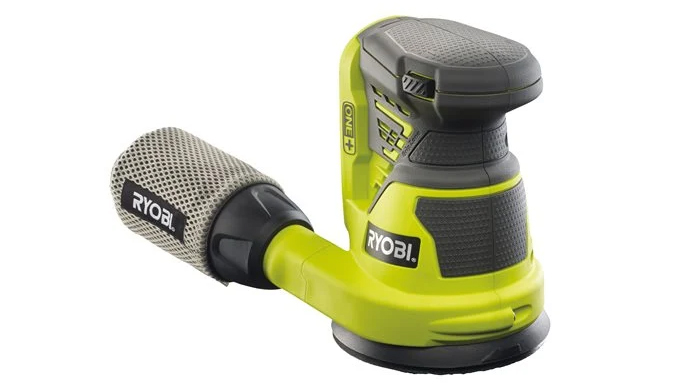
3. Ryobi ONE+ 18v Cordless Random Orbit sander
Specifications
Reasons to buy
Reasons to avoid
Ryobi's cordless orbital sander offering is a great starter for the home DIYer. With a cordless 18V battery, it's not as high-powered as some mains-powered sanders, but it's powerful enough for the majority of jobs you'd need an orbital sander for.
The built-in filtration system is important for capturing fine dust generated by using an orbital sander, but we'd still suggest using a mask and goggles when operating in a confined space. The velcro system for attaching sanding pads is easy to use, making changing between sandpaper grits quick and simple.
As part of Ryobi's One+ range, batteries can be used interchangeably between 150 different cordless tools.
Buy the Ryobi ONE+ 18V Cordless Random Orbit Sander
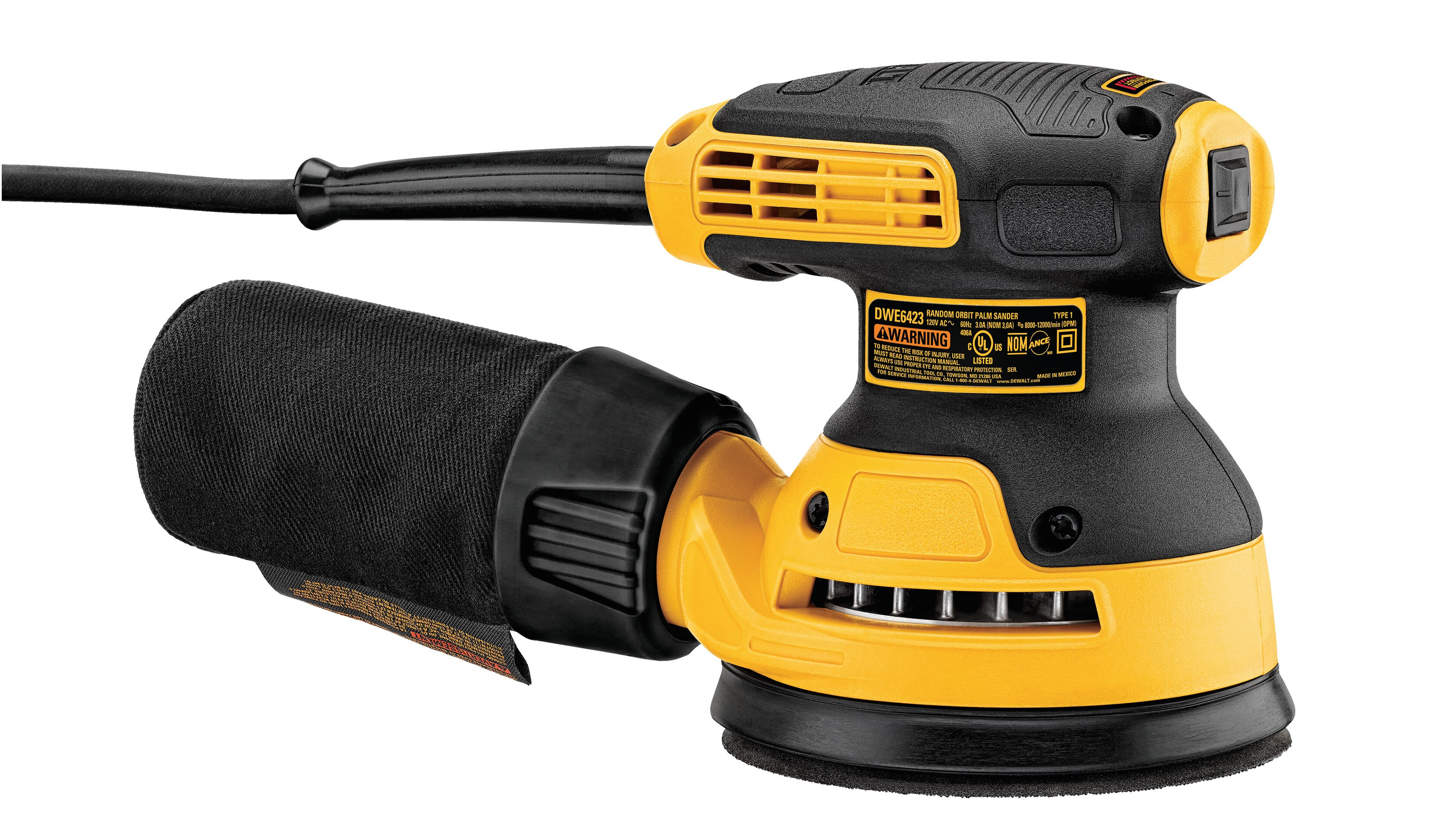
4. DeWalt DWE6423 Random Orbit Sander
Specifications
Reasons to buy
Reasons to avoid
Orbital sanders can cause hand fatigue when used for long periods, but DeWalt's DWE6423 orbital sander has low-vibration technology to reduce the effect, all the while offering a variable speed control for sanding all kinds of materials.
A super long 4 metre cord means this tool offers all the power of a corded orbital sander, but with great flexibility in movement and using at distances away from power outlets without an extension cord.
However, while this orbital sander has an ergonomic palm grip design, it lacks an extra grip for superior handling.
Buy the DeWalt DWE6423 Random Orbit Sander
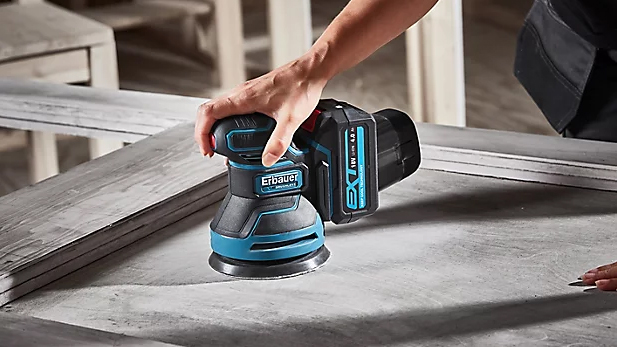
5. Erbauer EXT ERO18-Li Cordless Orbital Sander
Specifications
Reasons to buy
Reasons to avoid
The Erbauer ERO18-Li orbital sander is a good shape and size for a cordless orbital sander, making it easy to store while suiting lightweight sanding projects perfectly. The sander has a clear dust extraction box, but also comes with a vacuum adapter.
Again, this cordless orbital sander has one speed only, making it less versatile, but simple to operate and a good fit for DIY beginners with simple tasks to carry out.
This model is part of the EXT range — you can interchangeably use batteries from across the range, but note that they're not compatible with older non-EXT Erbauer models.
Buy Erbauer EXT ERO18-Li Cordless Orbital Sander
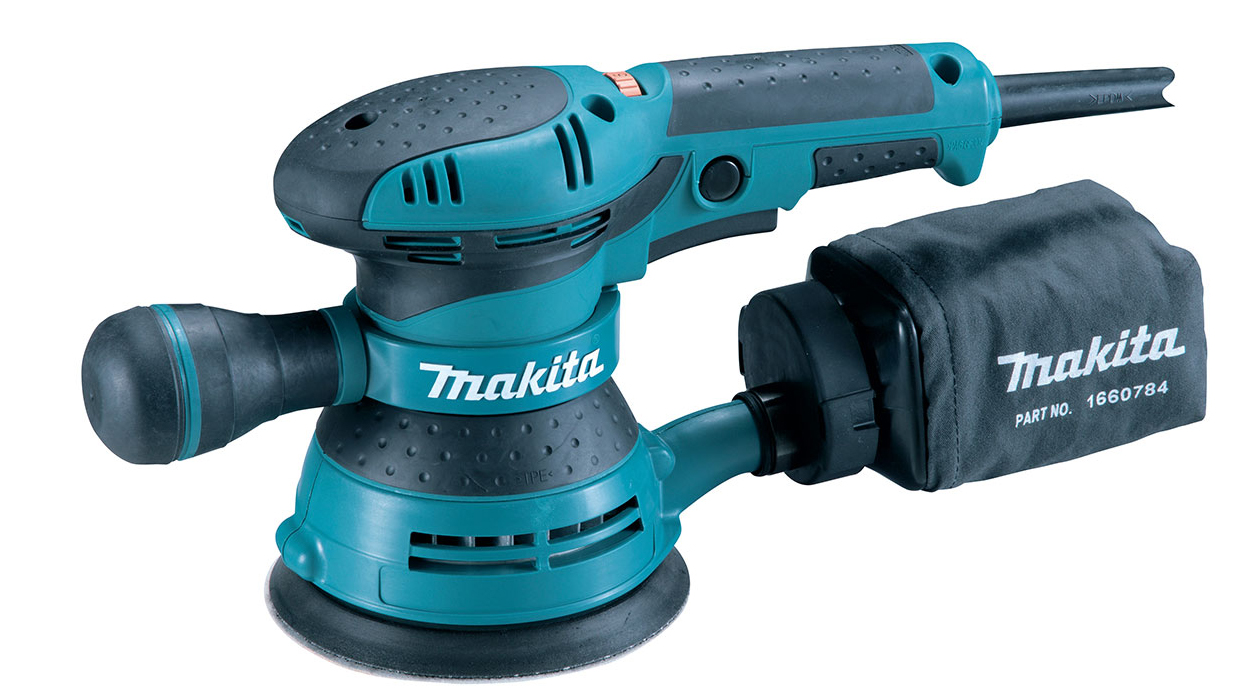
6. Makita BO5041 240v Random Orbit Sander
Specifications
Reasons to buy
Reasons to avoid
Makita's BO5041 orbital sander has an ergonomic body along with a front grip that makes the tool easy to handle. As a corded model, it's slightly larger than cordless varieties, which can make storage more of an issue, but for those instances where power is important, the 240V motor comes up trumps.
A variable speed setting is a major benefit of this Makita orbital sander, allowing you to set the rotation speed depending on the task at hand, and for more control when trying to lightly sand.
This tool has a built-in dust extraction system, and uses a velcro hook and loop system for sanding pads.
Buy the Makita BO5041 240v Random Orbit Sander
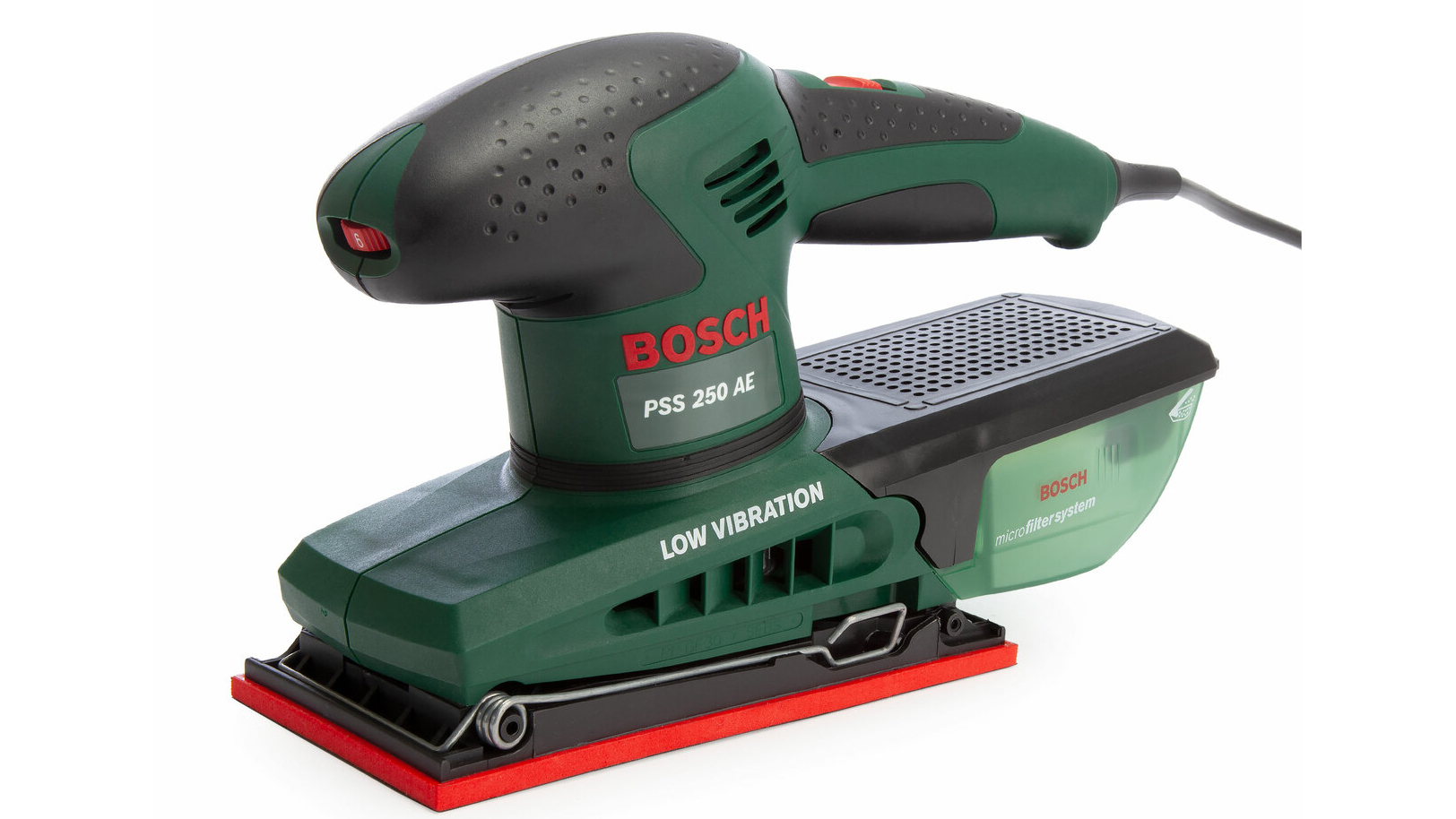
7. Bosch PSS 250 AE Orbital Sander
Specifications
Reasons to buy
Reasons to avoid
You might think an orbital sander needs to be round, but that's not the case. Bosch's PSS 250 AE has a long rectangular sanding plate, which can help make tasks where you need to get into corners easier than a circular plate.
While the rectangular sanding sheets for an orbital sander may not be as common as the circular ones, you shouldn't have too much trouble finding them at any DIY store or ordering online.
In all other fields, it's a relatively powerful orbital sander with a wide-ranging variable speed. Though it doesn't have a secondary handle, the design is ergonomic enough for easy use, and the 2.5m cable isn't the longest available, but is sufficient for most uses.
Buy Bosch PSS 250 AE Orbital Sander
WATCH: What to look for in an orbital sander
What is an orbital sander?
An orbital sander doesn't just refer to a sander that is circular, as not all orbital sanders are, but rather one that moves in miniscule circular motions without rotating.
The majority of modern orbital sanders are referred to as 'random' orbital sanders. Where a traditional orbital sanders just moves in circles, a random sand moves up and down too, helping to reduce swirl patterning in the wood as a result of using the sander.
What jobs is an orbital sander suitable for?
A decorator might use an orbital sander for walls to even out uneven plastering, using a fine grit of sandpaper. It can also be used in between coats of plaster, with a very fine grit sandpaper, for a smoother, even finish.
An orbital sander is also used to sand down wood. If you’re putting a worktop in, for example, and it’s a bit rough, or if you put a joint in with a small discrepancy of half a mm or so, an orbital sander is perfect for making right.
An orbital sander can also be used to strip paint off, and is particularly useful when renovating a house with architraves and skirtings covered in layers of gloss paint. Use a high grit and you’ll be able to strip this wood back, ready for your primer and undercoat.
Orbital sanders aren't suited to large surface areas of wood — a belt sander has a large surface of sandpaper so will be a lot quicker to use.
A orbital sander can't be used to cut objects, and it won’t polished up concrete or screed — it’s purely for timber and the likes of filler and plaster.
What should you look out for when buying one?
When you look to buy one, look for dust extraction. You have different kinds of filters, and some have a hose that can be fitted to an extraction unit. As it produces a very fine dust, you don’t really want to breathe that in. Check you have a good filter system, or an extraction point you can connect a hose to.
For cordless models, look for a high AH rated battery and always opt for two batteries and one charger — if you’re using it for a whole day, one battery won’t last.
Sandpaper-wise, you should look for clog-free velcro sandpaper. You can get ones that don’t have the holes, but these are more likely to clog up and make it more difficult for the pads to stick to the orbital sander.
Also consider whether a guiding handle is useful for the task in hand. A lot of them don’t have this feature but with this you can guide the sander a lot better, rather than just having your palm on it.
How much maintenance does an orbital sander need?
With the fine dust, orbital sanders can get clogged up internally. Look for something that can blast it with air to clean it.
Change the filters regularly to check they’re working. If you’ve got an extraction unit, make sure that you check that’s not clogged too. Give it a bit more maintenance than power tools such as a combi drill or an angle grinder.
Get the Homebuilding & Renovating Newsletter
Bring your dream home to life with expert advice, how to guides and design inspiration. Sign up for our newsletter and get two free tickets to a Homebuilding & Renovating Show near you.
Hugh is editor of sister title Livingetc.com and former digital editor of homebuilding.co.uk. He has worked on a range of home, design and property magazines, including Grand Designs, Essential Kitchens, Bathrooms, Bedrooms and Good Homes. Hugh has developed a passion for modern architecture and green homes, and moonlights as an interior designer, having designed and managed projects ranging from single rooms to whole house renovations and large extensions. He's currently renovating his own Victorian terrace in Essex, DIYing as much of the work as possible. He's recently finished his kitchen renovation, which involved knocking through walls, and landscaping a courtyard garden, and is currently working on a bathroom renovation.

